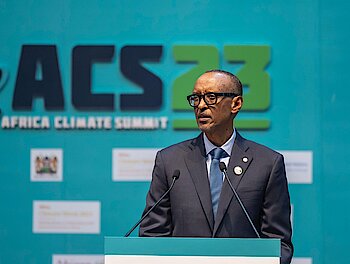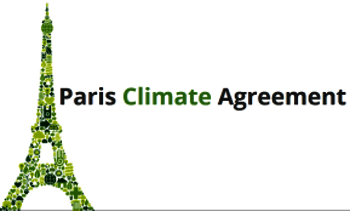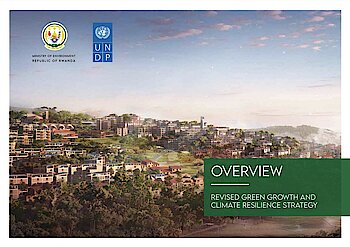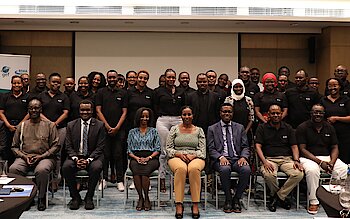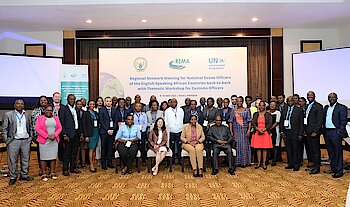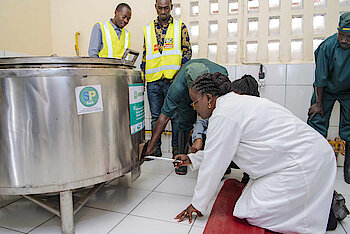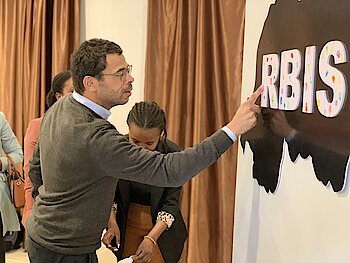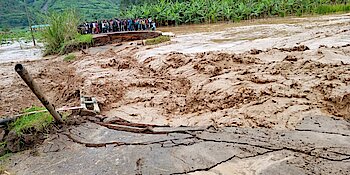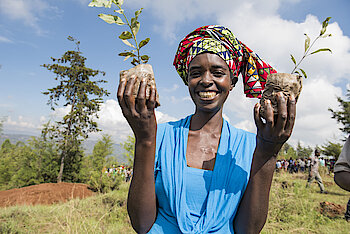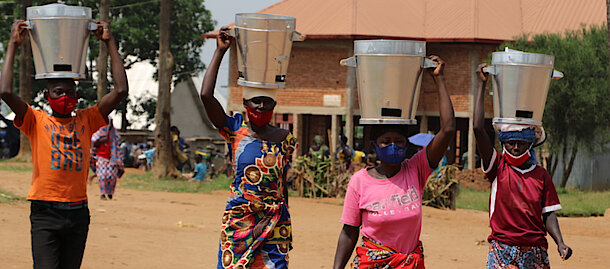
Beneficiaries of REMA’s Green Amayaga Project receive improved cookstoves to promote energy efficiency
Rwanda Environment Management Authority through the Forest Landscape Restoration in the Amayaga Region (Green Amayaga) Project is distributing improved cookstoves to beneficiaries of the project in Kamonyi district.
These cookstoves are being distributed to promote energy efficiency as one of the project components.
From Tuesday, 23rd February 2021 to Friday 26th February 2021, four thousand (4,000) cook stoves were distributed to beneficiaries of the Project in Mugina sector in Kamonyi district to help them improve human health and contribute to deforestation and climate change mitigation.
In total, 11,000 improved cookstoves will be distributed in Kamonyi four sectors of Kamonyi district in financial year 2020/2021. Four thousands (4,000) cookstoves will be distributed in Mugina sector, 4,000 in Nyamiyaga sector, 1,500 in Nyarubaka sector, and 1,500 in Rugarika sector.
Other districts (Gisagara, Nyanza and Ruhango) will start receiving the same cookstoves next financial year 2021/2022.
In all districts covered by the project, 60,000 improved cookstoves will be distributed over the six years of the project, which will reduce about 5 Million tons of GHG emissions in 6 years and this means that, as REMA explains, in 20 years those cookstoves will reduce 15 Million GHG emissions compared to the air pollutants we currently have in Rwanda.
The cookstoves’ thermal efficiency is above 30 and save firewood more than 50% comparing to traditional way of cooking (3 stones) which make them contribute to deforestation mitigation.
These cookstoves will also contribute to socio-economic development of beneficiaries, since due to their efficiency to save energy and time, beneficiaries will get the opportunity to do other income generating activities.
Green Amayaga Project is a ground-breaking six-year initiative that will afforest the degraded ecosystem and restore the natural forests of four districts in Rwanda’s Southern Province. It also aims at building resilience of Amayaga region community to climate change.
Beneficiaries of Green Amayaga Project commend the project’s interventions, as distributed cookstoves will greatly contribute to gender equality.
According to Jeannette Nyiramana, a resident of Nteko cell, Mugina sector in Kamonyi district, “women who are mostly involved in family responsibilities, will also get the opportunity to do other income generating activities due to the cookstove’s efficiency to save energy and time”
Green Amayaga Project under REMA’s implementation is funded by the Global Environment Facility (GEF) trough the United Nations Development Programme (UNDP). Its intervention areas are Kamonyi, Nyanza, Ruhango and Gisagara districts.
Topics
More posts
Africa Climate Summit | National Statement by President Kagame | Nairobi, 5 September 2023
First, I wish to thank President Ruto for hosting us in beautiful and vibrant Nairobi for the Africa Climate Summit, organized in collaboration with…
Strengthening Transparency in Climate Action: Rwanda's Progress under the Enhanced Transparency Framework
Climate change is a global challenge that requires urgent action. Rwanda, like many other countries, is experiencing the impacts of climate change,…
RWANDA LAUNCHES REVISED GREEN GROWTH AND CLIMATE RESILIENCE STRATEGY
Rwanda has on June 5, 2023 launched the Revised Green Growth and Climate Resilience Strategy as part of World Environment Day celebrations. The…
REMA LAUNCHES THE EVIDENCE-BASED CLIMATE REPORTING INITIATIVE TO ADVANCE CLIMATE RESEARCH AND REPORTING
The Rwanda Environment Management Authority (REMA) in collaboration with the African Institute of Mathematical Sciences (AIMS) have on May 19, 2023…
NATIONAL OZONE OFFICERS MEET IN KIGALI TO DISCUSS THE IMPLEMENTATION OF MONTREAL PROTOCOL AND ITS KIGALI AMENDMENT
The Rwanda Environment Management Authority (REMA) in collaboration with the United Nations Environment Programme (UNEP)’s OzonAction has organized a…
REMA OFFICIALLY LAUNCHES THE LPGS DONATED TO 20 SCHOOLS IN GREEN AMAYAGA PROJECT INTERVENTION AREA
The Minister of Environment, Dr. Jeanne d’Arc Mujawamariya has on 3rd May 2023 launched the use of Liquefied Petroleum Gas (LPG) for bulk cooking in…
The Rwanda Biodiversity Information System to Drive Climate Change Adaptation and Conservation was launched
The Center of Excellence in Biodiversity and Natural Resource Management at the University of Rwanda has launched the Rwanda Biodiversity Information…
Essential things to know about the loss and damage due to climate change
The evidence of both global and local climate change impact is beyond dispute. There are clear effects of climate change occurring all across the…
Why Women’s Consideration is a Key in battling climate change impacts?
The livelihoods of billions of people throughout the world are highly impacted by climate change, despite efforts to reduce its hazards. This is…
